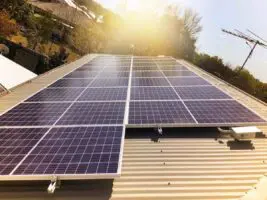Australia has a chance to generate a massive boost to the economy and revitalise a shrinking manufacturing sector by embracing clean energy technologies, a new research report has argued.
The report, published by the Centre for Future Work, found that Australia could substantially boost gross domestic product and create as many as 400,000 new jobs by targeting industry support towards green manufacturing jobs, including renewable energy and battery storage production.
The Centre for Future Work argued that reinvesting in Australia’s manufacturing industry was fundamentally important for diversifying the economy and that Australia had fallen behind other developed countries in terms of the strength of its manufacturing industries.
“As Australian governments and business leaders realise the importance of manufacturing in rebuilding the national economy after COVID, this research shows that Australia now has the smallest manufacturing industry relative to domestic purchases of any OECD country,” report author and director of The Australia Institute’s Centre for Future Work Dr Jim Stanford said.
The research report cites battery manufacturing has a high-prospect industry for Australia, recognising that Australia already has most of the raw materials necessary to produce leading energy storage technologies like lithium-ion batteries.
Australia is one of the world’s leading producers of raw lithium, but the material is worth dramatically more once it has been processed into a form suitable for use in battery manufacturing. It is worth more, again, once used in end battery products.
The findings of the report follow a commitment from the Western Australian government to expand the state’s battery production capabilities after an assessment found it held reserves of nine of the 10 materials needed in the production of lithium-ion batteries.
The Western Australian government also found that the international markets for lithium-ion batteries could grow 10-fold by 2025, as demand for energy storage systems and the sales of electric vehicles continue to surge.
By value-adding the raw materials that are present within Australia, it is possible to grow the value of Australia’s exports while also creating new job opportunities in modern industries that are set to grow rapidly in coming decades.
“These findings confirm the enormous task ahead of the country in rebuilding our domestic manufacturing capacity. However, it also highlights the enormous economic benefits that would be generated by getting manufacturing back to a proportional size: including $180 billion in new sales, $50 billion in new GDP, and over 400,000 new direct jobs,” the report says.
“While two-way international trade in manufactured products will always be essential, as a nation we should be manufacturing in aggregate as much as we are using. If we rebuilt a manufacturing sector that was broadly proportionate to our needs, our manufacturing industry would grow by almost 50% – generating enormous benefits in jobs, incomes, innovation and exports.”
The Centre for Future Work’s research report also pointed to the possibility of Australia establishing a renewable energy export industry, as well as using increasingly cheap renewable energy to fuel the local manufacturing sector.
A handpicked working group tasked with advising the Morrison government on supporting the manufacturing industry through the Covid-19 pandemic, which was stacked with gas industry lobbyists, has recommended that the federal government effectively underwrite new gas projects to boost the supply of “low cost” energy.
However, it is likely that cheaper energy can be produced, and supplied to the manufacturing sector, through investments in low marginal cost wind and solar projects.
European manufacturers are already trialling the use of renewable energy in energy-intensive manufacturing operations, including steelmaking, providing a pathway to cutting both the costs of production and the greenhouse gas emissions from sectors that have otherwise been dependent on coal or gas.
“Renewable energy offers great potential to strengthen the energy supply base for Australian manufacturing, and foster new competitive industries and exports. The technology and economics of renewable energy has been dramatically transformed in recent years,” the research report says.
“By connecting manufacturing investments with renewable energy developments, Australia has the possibility to simultaneously accelerate the roll-out of renewable energy systems (with great economic and environmental benefits), while expanding Australian manufactured inputs to those projects.”









